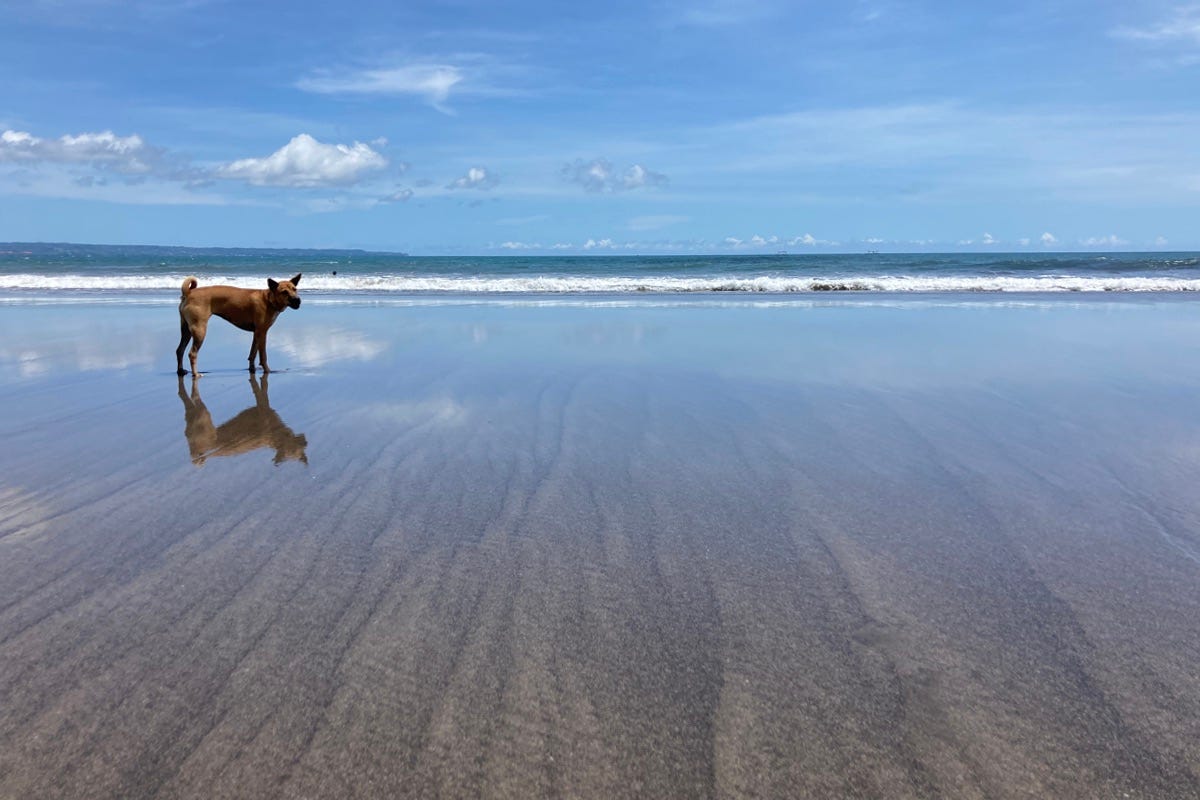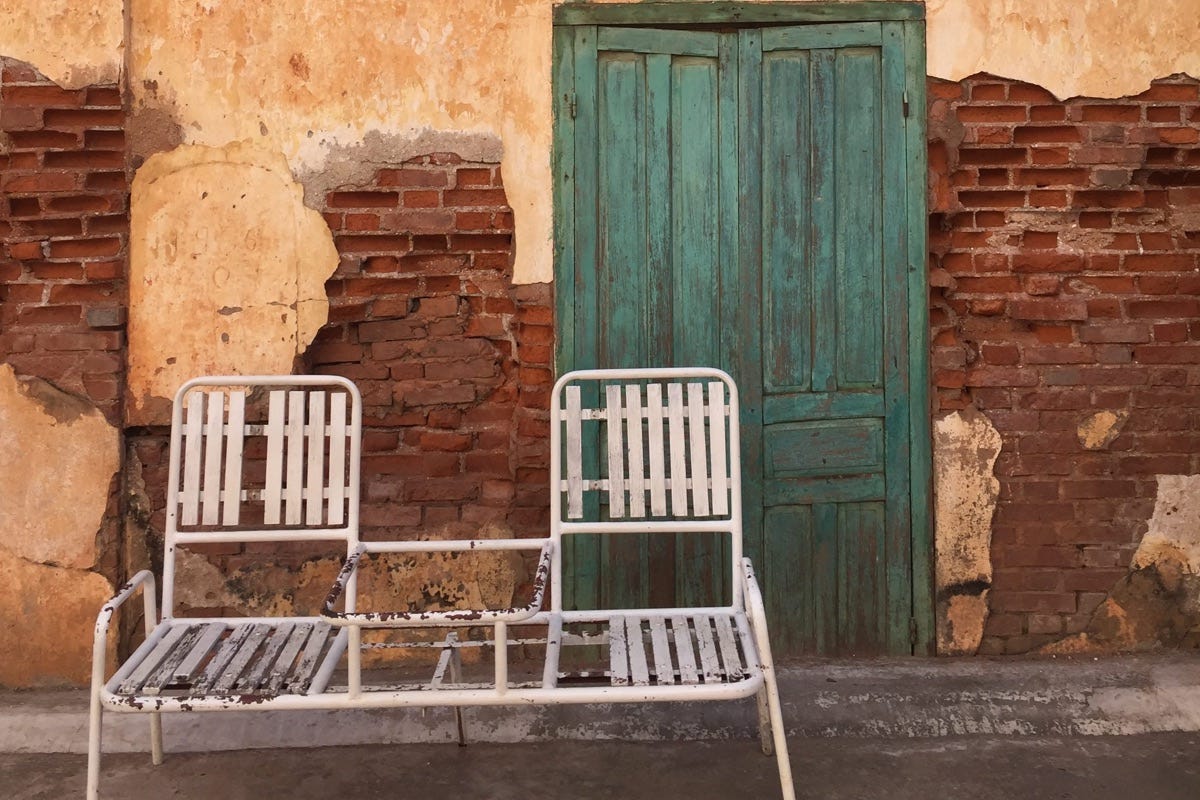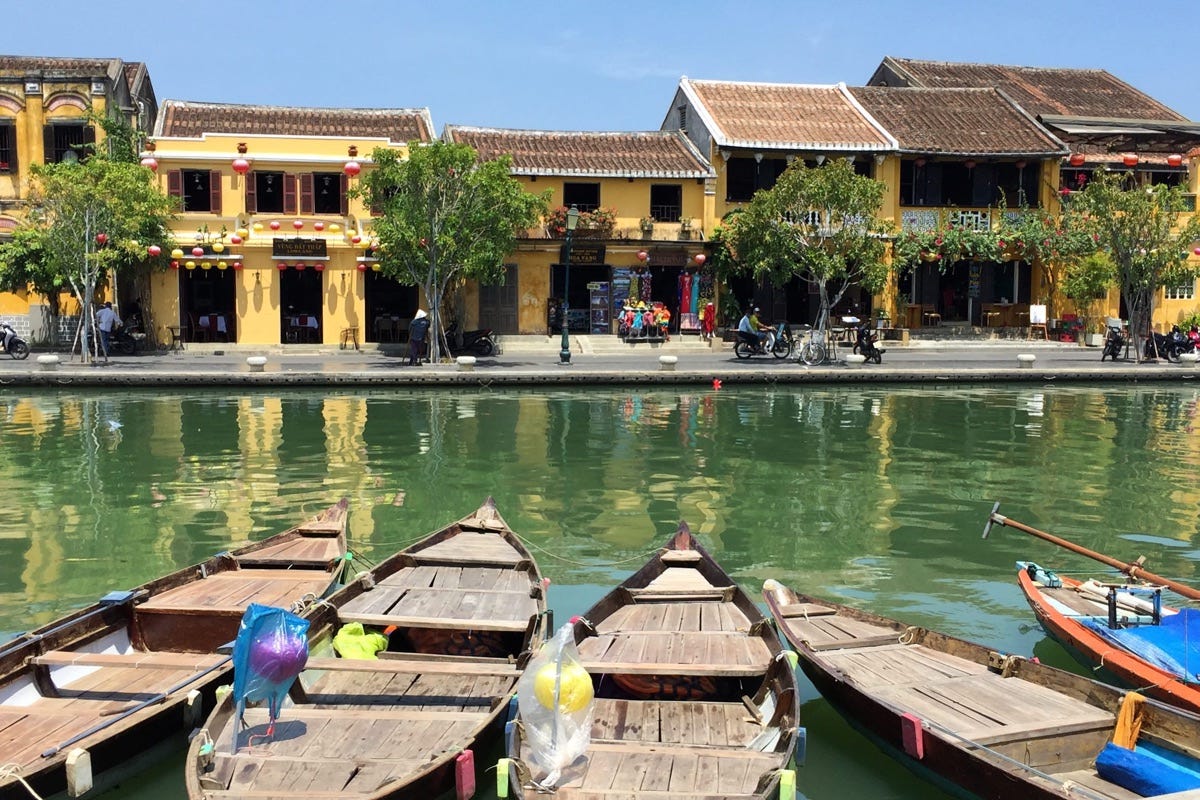Side note: I’ve linked to a lot of other Couchfish writing in this post, but I’ve tried to link solely to the free–to–read pieces—enjoy! Want to read them all? Get 50% off a Couchfish membership here.
Most days I ride down to the beach to write. It isn’t far, five minutes on a scooter. Today, thanks to a new neighbour who has decided to learn the saxophone, I head down earlier. I get my pot of 15,000 rupiah bad coffee and write for an hour, as that’s as long as my laptop battery lasts. It’s amazing how much I can get done in that 60 minutes, but today it isn’t enough. Laptop flat, I gaze at the surf and beach wanderers with their dogs, the saxophone was still rattling around in my head.
My beach writing companion. Photo: Stuart McDonald.
Today, Couchfish is two years old and I have a bit to say—or more than an hour’s worth of typing anyway. Two years. Where did that go? I re-read the one-year post—depending on the day, it feels like I wrote it yesterday—or a decade ago.
Between dog walkers, I read. The Routledge Companion to Travel Writing no less. To be honest, it’s not my kind of travel companion, it’s a right tome, even if an electronic one. It’s one of those anthology things, with dozens of chapters on all things travel writing, from post-colonial critiques, and the ethics of fabulation (no, I didn’t know that was a word either), through to ironic adventures and yes, guidebooks. Perfect procrastination material.
Couchfish is two years old!
Today is the two–year anniversary of Couchfish. To celebrate, I’m offering a 50% off deal until April 14 on annual subscriptions. So this means it costs US$35 instead of $70—for the year. Already a subscriber? First, thank you, second, feel free to send the link to your friends—all are welcome!
In the section on travel blogs, it references a travel writer by the name of Jeff Greenwald, who has been credited with uploading the first-ever travel blog—in 1994. That leads me to a piece in WIRED which I can only partly read as it is paywalled. An amusing anecdote recounts him attempting to transmit a postcard from Kathmandu to the States, the first-ever sent from the Nepalese capital. Greenwald writes:
“The main bottleneck, of course, was transmission speed. In June, 1994, I’d reached South Asia. Working with the brilliant Sanjib Bhandari (then known as “The Bill Gates of Nepal”), we scanned and uploaded the first image ever sent by Internet from Kathmandu: a postcard of elephant-headed Ganesha, the Hindu god of good beginnings. Sending the picture to WIRED took the technicians at Bhandari’s computer center nearly 14 hours.”
Nineteen ninety-four. Less than thirty years ago. I’d been kicking around Kathmandu the year before Greenwald’s visit and wouldn’t have known what an Internet cafe was if I was standing in front of it. Poste Restante? Yup. Internet cafe? Nope.
Pull up a seat. This might take a while. Savannakhet, Laos. Photo: Cindy Fan.
This sort of thing feels like memories from another lifetime, but in trying to read Greenwald’s actual first piece, I hit the paywall and it gives me pause. Not so much to consider if I’m going to pay WIRED (I’m not) but rather what the landscape would be like today, both in travel publishing and in travel more generally, had a paywall been the norm back then. A question I’m sure still keeps newspaper publishers up at night.
Side note: I understand that when Greenwald’s piece was first published it wouldn’t have been paywalled, but rather has been paywalled since, but bear with me, it’s just a handy in to what I want to write about.
I’ve been working on a story about overtourism for what feels like an age now. The more people I talk- and listen to, and the more I read, I keep circling back to travel writing’s role in it all. So not being able to read the planet’s first-ever travel blog because of a paywall sort of leaves me gazing at the waves for a spell.
My pensive place. Bingin Beach, Bali. Photo: Stuart McDonald.
In the same anthology, Scott Laderman writes, on guidebooks and their “marginality” or lack of value for analysis within academia:
“On the contrary, guidebooks constituted probably the most influential form of travel writing of the twentieth century, helping countless tourists set their itineraries and interpret what they would see.”
And then, a little later, writing on what guidebooks do and the context they can provide, highlighting the very essence of what a good guidebook has that Instagram never will:
“They inform tourists what is worth visiting or noticing, and, crucially, they suggest how these worthwhile attractions should be interpreted and understood."
And then, finally, the money quote:
“By implication, those places that go uncovered find themselves relegated to unworthiness. If guidebooks elect not to sacralize a destination, does it really merit a visit?”
The flip side of Laderman’s implication being the old chestnut of guidebook writers ruining places. The Lonely Planet touch of death and all that.
This brings me back to the paywall thing. Any sentient being can tell you paywalling material online means fewer people read it. I Google “best things to do in Bali” and the search engine tells me it has 132,000,000 results. I wonder how many of the results people would pay for? No, I’m not going to sledge the results (though yes, there are some awful search engine results on page one), but if travel had been hidden behind a paywall from 1994 when Greenwald used up the entirety of Nepal’s bandwidth to beam Ganesha across the Pacific, how many of those 132,000,000 results would have ever existed? Is it a chicken and the egg thing? I’m not sure.
We flew. Over and over. The kids will be the ones who pay for it. Photo: Stuart McDonald.
People rightly flog low-cost airlines with regard to overtourism. Take AirAsia, who, like other budget airlines, by ignoring the environmental costs of its services is able to offer seats priced on par with a bus ticket, and then declare “Now everyone can fly.” They sure can—and they have—future generations will pay the real costs of all those cheap and often frivolous flights.
But how about the internet in general? How many people would have travelled overseas without the internet to get their feet itching thanks to a bazillion lists of what to do in Bali? While I have absolutely no firm evidence for this, my gut feeling is “less”.
So, by extension, online travel writing, including the over a million words on Travelfish and the roughly 150,000 on Couchfish, shares some portion of the blame for overtourism.
Wow, that is a very scenic route to get to what I woke up this morning wanting to say.
As I’ve written before, on multiple occasions, the two-year pandemic-enforced travel shutdown presents a once in a lifetime (or once in a till-the-next-pandemic time) opportunity for both travellers and the travel industry to recalibrate. Regarding the latter of the two parties, if you’ve read any of the news of the last week or so, the travel industry (by and large, yes I know there are exceptions) has no intention whatsoever of changing its practices. That leaves it to the former to change their behaviour, but let me start with me, well, me as a travel publisher.
It is easy to sit here and say “do better”, but the best path to travel publishing in a “more responsible” fashion is akin to climbing a volcano—pitfalls and eruptions aplenty. How do you make a travel publication more socially, culturally, environmentally and economically responsible? Oh, and remain profitable? For the two years of the pandemic, I’ve been asking myself this question. Late last year I thought I’d finally got my head around a solution and I built an assignment for my Masters around it. I asked “how do I make Travelfish more responsible?” Not only did I almost fail, I got the lowest mark in my class—a new experience for me. Nobody says this is going to be easy.
Ko Kut’s beaches—I’d use a lot more qualifiers now. Photo: Stuart McDonald.
Take a look at what the big travel publishing houses are running as things warm up again, and, like the airlines, for many, it’s a speedway back to 2019. The industry, be they airlines or travel publishers, or whatever, will eventually follow the money though. If enough people change how they travel, they may even move in the right direction.
My favourite example here is “responsible travel,” a term coined by the UK travel industry to define a market. There were already people travelling in a “responsible” manner, but the label made them a market. An industry emerged catering to what developed into a lucrative niche. I should say, lucrative for the agencies more than the destinations, but it was a step in the right direction. While responsible travel is less than perfect, it did indicate the scene is capable of following traveller-led change.
A few months ago, I received an irate email from a reader after I’d published one of my many “travel is eating the planet” style pieces. They wrote, in part:
“You write about the travel industry like it’s the coal industry. It isn’t. You need to fix your perspective.”
I’ve mulled over the above a lot, but I can’t help but think if, over the last thirty years, a more critical eye had been levelled at the travel industry as a whole, perhaps it would have developed in a more responsible manner.
Couchfish is two years old!
Today is the two–year anniversary of Couchfish. To celebrate, I’m offering a 50% off deal until April 14 on annual subscriptions. So this means it costs US$35 instead of $70—for the year. Already a subscriber? First, thank you, second, feel free to send the link to your friends—all are welcome!
It is afternoon now, and I’m sitting across from rice fields, around the corner from where I live. They’re being filled in for more villas. The whole debate feels academic, all spilt milk really, it is what it is.
It isn’t all bad though, change is happening—really—but it needs to happen faster, and that’s something we, as travellers, can help along.
Hoi An, less than a year before Covid-19 hit. Overtouristed? Photo: Stuart McDonald.
At Couchfish I’ll keep beating the drum, the itinerary of course will continue, but I’ll not be easing back from demanding better.
So how can we, as travellers, help? Regular readers will already know my take on this, but here’s my cheat sheet, in no particular order. Pick and choose what works for you—all of these will help, some more than others.
1) If there’s perfectly adequate ground transport that doesn’t take 82 days for the same journey, don’t fly domestically.
2) Don’t take frequent short trips that involve flying.
3) Travel locally.
4) Learn from your mistakes.
5) Buy a guidebook, a paper one, read the front and back bits.
6) Read books about where you are. It need not be some dense historical tome. We have a bunch on Travelfish to get you started.
7) Ask yourself how your being somewhere benefits the local community. How can you increase those benefits—and reduce the costs?
8) Stick with a loose plan full of wriggle room—you’re travelling, not on a military expedition.
9) Stay another day, slow down, linger.
10) Spend time with a local travel/food/whatever evangelist.
11) Do support small, family-owned or independent businesses.
12) Eat local food.
13) Think before you eat imported.
14) Stick to one country and explore it.
15) Do make an effort to have a constructive impact—be it helping with a beach clean-up or forgoing the imported wine (though do avoid Chateau de Battambang and Hercules Wine).
16) Do make a donation to an organization doing good work.
17) Do reward environmentally-friendly businesses with your business.
18) Do ask harder questions about practices. If a business says they’re green, challenge them. If businesses can’t or won’t answer your questions, go elsewhere.
19) Research, research and research some more. Set yourself a baseline and every trip try to do better. The little things, they all add up to something far bigger.
And, most importantly,
20) If you’re staying in South Bali, please leave your saxophone at home.
Couchfish is 100 per cent independent and reader-supported. If you’re not already a subscriber, and you’d like to show your support, become a paying subscriber today for just US$7 per month—you can find out more about Couchfish here—or simply share this story with a friend. Better still get 50% off all plans (until April 14) here.
Don’t forget, you can find the free podcasts on Apple, Pocket Casts and Spotify as well as right here on Couchfish.
















